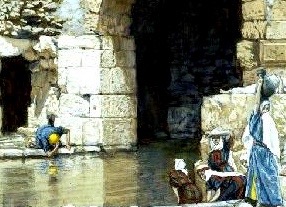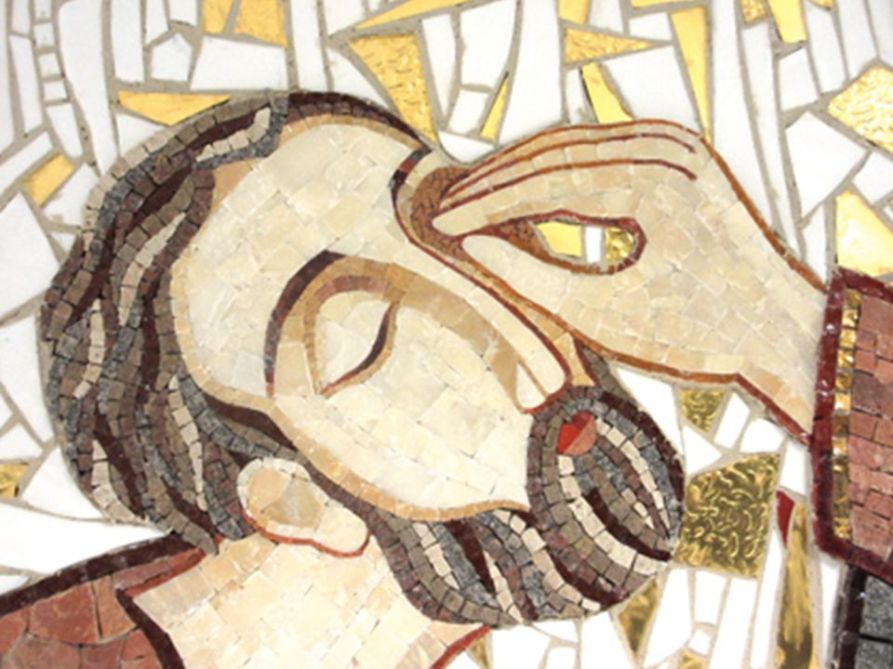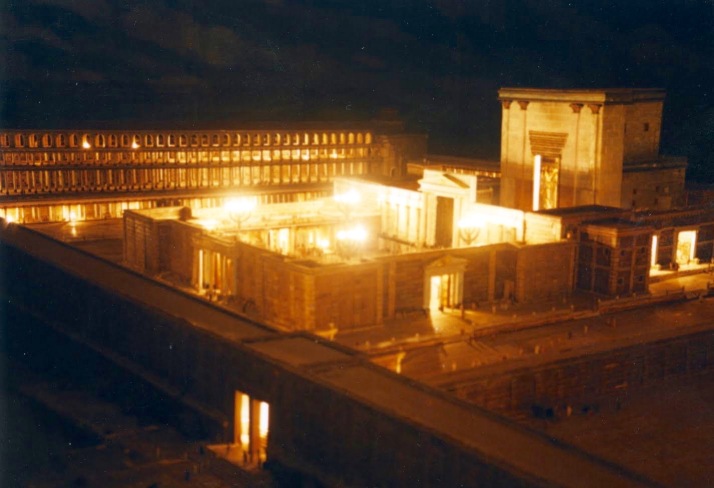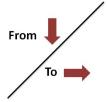John 9, 1 – 41
1 As Jesus went along, he saw a man who had been blind from birth.
2 His disciples asked him, ‘Rabbi, who sinned, this man or his parents, that he should have been born blind?’
3 ‘Neither he nor his parents sinned,’ Jesus answered, ‘he was born blind so that the works of God might be revealed in him.
4 ‘As long as day lasts we must carry out the work of the one who sent me; the night will soon be here when no one can work.
5 As long as I am in the world I am the light of the world.’
6 Having said this, he spat on the ground, made a paste with the spittle, put this over the eyes of the blind man,
7 and said to him, ‘Go and wash in the Pool of Siloam’ (the name means ‘one who has been sent’). So he went off and washed and came back able to see.
8 His neighbours and the people who used to see him before (for he was a beggar) said, ‘Isn’t this the man who used to sit and beg?’
9 Some said, ‘Yes, it is the same one.’ Others said, ‘No, but he looks just like him.’ The man himself said, ‘Yes, I am the one.’
10 So they said to him, ‘Then how is it that your eyes were opened?’
11.He answered, ‘The man called Jesus made a paste, daubed my eyes with it and said to me, “Go off and wash at Siloam”; so I went, and when I washed I gained my sight.’
12 They asked, ‘Where is he?’ He answered, ‘I don’t know.’
13 They brought to the Pharisees the man who had been blind.
14 It had been a Sabbath day when Jesus made the paste and opened the man’s eyes,
15 so when the Pharisees asked him how he had gained his sight, he said, ‘He put a paste on my eyes, and I washed, and I can see.’
16 Then some of the Pharisees said, ‘That man cannot be from God: he does not keep the Sabbath.’ Others said, ‘How can a sinner produce signs like this?’ And there was division among them.
17 So they spoke to the blind man again, ‘What have you to say about him yourself, now that he has opened your eyes?’ The man answered, ‘He is a prophet.’
18 However, the Jews would not believe that the man had been blind without first sending for the parents of the man who had gained his sight and
19 asking them, ‘Is this man really the son of yours who you say was born blind? If so, how is it that he is now able to see?’
20 His parents answered, ‘We know he is our son and we know he was born blind,
21 but how he can see, we don’t know, nor who opened his eyes. Ask him. He is old enough: let him speak for himself.’
22 His parents spoke like this out of fear of the Jews, who had already agreed to ban from the synagogue anyone who should acknowledge Jesus as the Christ.
23 This was why his parents said, ‘He is old enough; ask him.’
24 So the Jews sent for the man again and said to him, ‘Give glory to God! We are satisfied that this man is a sinner.’
25 The man answered, ‘Whether he is a sinner I don’t know; all I know is that I was blind and now I can see.’
26 They said to him, ‘What did he do to you? How did he open your eyes?’
27 He replied, ‘I have told you once and you wouldn’t listen. Why do you want to hear it all again? Do you want to become his disciples yourselves?’
28 At this they hurled abuse at him, ‘It is you who are his disciple, we are disciples of Moses:
29 we know that God spoke to Moses, but as for this man, we don’t know where he comes from.’
30 The man replied, ‘That is just what is so amazing! You don’t know where he comes from and he has opened my eyes!
31 We know that God doesn’t listen to sinners, but God does listen to people who are devout and do his will.
32 Ever since the world began it is unheard of for anyone to open the eyes of someone born blind;
33 if this man were not from God, he wouldn’t have been able to do anything.’
34 They retorted, ‘Are you trying to teach us, and you a sinner through and through ever since you were born!’ And they ejected him.
35 Jesus heard they had ejected him, and when he found him he said to him, ‘Do you believe in the Son of man?’
36 ‘Sir,’ the man replied, ‘tell me who he is so that I may believe in him.’
37 Jesus said, ‘You have seen him; he is speaking to you.’
38 The man said, ‘Lord, I believe,’ and worshipped him.
39 Jesus said: It is for judgement that I have come into this world, so that those without sight may see and those with sight may become blind.
40 Hearing this, some Pharisees who were present said to him, ‘So we are blind, are we?’
41 Jesus replied: If you were blind, you would not be guilty, but since you say, ‘We can see,’ your guilt remains.
New Jerusalem Bible
DLT & Doubleday 1985
FAITH CELEBRATED
BAPTIZED INTO CHRIST THE MAN BORN BLIND WAS ENLIGHTENED
Commentators like Fuller and Westberg consider the short form of the gospel (9, 1. 6 – 9. 13 – 17. 34 – 38) to be the original simple story of Jesus healing a man born blind (vv 14 – 15. 33). In the sixth of seven miracles in the Book of Signs, John narrates Jesus’ compelling actions (vv 6 – 7).
Although generally regarded repulsive and anti-social Jesus “spat on the ground.” He mixed his spittle with earth and applied the mud on the man’s eyes, conveying his healing and creative power on him. Jesus then told the man to “wash in the Pool of Siloam,” the name meaning “one who has been sent” in Hebrew. The man returned able to see.

John 9, 7
Man born blind washing at Pool of Siloam in Jerusalem
Excerpt of Art Source: James Tissot 1836-1902
The man in this story was born with a bodily defect rather than being ill, as were the two persons in other miracles where Jesus used his spittle (Mark 7, 33 – 34; 8, 23 – 25). Semites in Jesus’ time regarded spittle as solidified breath. The story thus evokes the similar miracle of God in Jesus the eternal Word creating the first human being, as “coming from the ground” with God’s living breath (Genesis 2, 7).
Jesus in John 9 not only recreates new sight for the man born blind. The baptismal symbol of the miracle is evident with the man told to wash in the Pool of Siloam. In Jesus’ time, the water drawn from this Pool during the Feast of Shelters or Tabernacles symbolise messianic blessings. In John’s gospel, Jesus is repeatedly called the “one sent by the Father” as the Messiah (1, 1; 3, 17; 4, 34; 6, 38; 17, 4) who in turn poured out his Spirit at his last breath (19, 30).
CHRIST SCRUTINISES THE ELECT AND DISCIPLES TOWARD MATURITY OF FAITH
As Sunday 3 in Lent highlighted, the Second Scrutiny is “to uncover, then heal all that is weak, defective, or sinful in the hearts of the elect” (CIA 141).
In the prayer of exorcism, the celebrant prays to the “Father of mercy” who “led the man born blind to the kingdom of light through the gift of faith” in Jesus Christ his Son.” The prayer denotes a dual direction:
- purifying or “freeing the elect from the false values that surround and blind them” and
- enlightening them or “setting them firmly in God’s truth … as children of the light forever.”
St Ignatius in the meditation of Two Standards alerts the retreatant of the Tempter’s subtle pattern in steps similar to those encountered by Jesus tempted in the wilderness (cf Lent Season Sunday 1). “The first step is riches … second is honour … third is pride; and from these three steps the enemy entices them to all the other vices” (Spiritual Exercises 142).
The issue of temptation and sin runs through the complete reading of John 9 like a thread, first raised by Jesus’ disciples (v 2) as a red herring. Jesus coming into the world constitutes a “judgement or election.” As John 9 develops through the scenes, the man “without sight” saw Jesus in faith, whereas the “Pharisees … and the Jews … with sight become blind” (v 39).
With the man born blind and the elect, Christ’s followers need to be “enlightened” progressively in faith of Jesus. In John 9 the disciples and the man born blind grew in faith of Jesus as “Rabbi (v 2) … prophet of God (v 17) … Son of man (v 35) … to Lord (v 38).”
Coming to and growing in faith in Jesus Christ, as St Ignatius points out in the Two Standards, involves a pattern of three steps: from poverty to belittlement to humility, a process unlike that manifested in the Pharisees and the Jews.
The elect and Christ’s disciples need to distance themselves from the pattern shown in John 9 by “the Pharisees and the Jews” who were tempted progressively from “riches” as custodians of the Mosaic Law (v 16) to “empty honour” (vv 19ff) to overbearing “pride” by denigrating the man born blind and resorting to violence (v 34), the elect and the disciples are to be “purified” progressively in the opposite direction.
CHRIST’S DISCIPLES AS COWORKERS IN THE MISSION AGAINST DARKNESS
St Ambrose — briefly a catechumen before he was ordained and made Bishop of Milan — saw in Jesus’ action beyond “restoring in the blind man what was defective in nature.”
Jesus in John proclaimed as “light of the world” associated himself with the four huge candelabras lit in the Temple during the Feast of Tabernacles (Sukkot) in Jerusalem he attended (John chapters 7ff). In the symbolic action of the blind man washing in the Pool of Siloam Jesus gave the restored clay in the man the “light of of eternal life” in Ambrose’s phrase, through baptism, called in ancient times the “sacrament of illumination or enlightenment.”
Jesus in John and Christ in the ignatian Two Standards associates his disciples with the mission God has sent him to carry out. Taking Jesus’ words to heart “As long as I am in the world I am the light of the world” (v 4) “we” must continue his work in the struggle between light and darkness (Joh 1, 5; 12, 35-36).
Resources consulted
Christian Initiation of Adults, 1988.
George E Ganss, The Spiritual Exercises of St Ignatius, A Translation and Commentary. Gujarat Sahitya Prakash, 1993.
The New Jerusalem Bible. DLT & Doubleday and Company 1985.
Reginald H. Fuller and Daniel Westberg, Preaching the Lectionary: The Word of God for the Church Today, Revised Edition. Liturgical Press. 1984.
St Ambrose, Letter on John 9, 1 – 41: The blind man went off and washed himself and came away with his sight restored.
http://innocentsmith-bienpensants.blogspot.my/2009_03_01_archive.html
SONGS
GATHERING
I Heard The Voice Of Jesus
Horatius Bonar 1846
Tune: KINGSFOLD
https://www.youtube.com/watch?v=cSSiEixBt8E
Christ be Our Light
Bernardette Farrell
https://www.youtube.com/watch?v=caA4sIXkD44
https://www.youtube.com/watch?v=ZJq3bhdgQoc
PRESENTATION & PREPARATION OF GIFTS
Eye Has Not Seen
Marty Haugen
https://www.youtube.com/watch?v=rRyOS0nZr7s
COMMUNION
Beyond the Days
Ricky Manalo
https://www.youtube.com/watch?v=VSgUNV6HnIM
COMMUNION MEDITATION
Christ In Me Arise
Trevor Thomson
https://www.youtube.com/watch?v=f3UMu35iRww
He Healed the Darkness of My Mind
Fred Pratt Green / David Haas
https://www.youtube.com/watch?v=p4oUMXjLFlU
SENDING FORTH
Open My Eyes
Jesse Manibusan
https://www.youtube.com/watch?v=eo6gZAUuQ3E
The Lord is My Light
Christopher Walker
https://www.youtube.com/watch?v=VNJCGEQPwk4
1 = 1st reading
P = Responsorial Psalm
2 = 2nd Reading
G = Gospel
FAITH CONVERTED
At the Second Scrutiny the celebrant prays that the elect — freed from the slavery of sin and enlightened by Christ’s light — might prove to be “staunch and fearless witnesses to the faith” (CIA 168).

John 9, 6
Jesus made a paste with the spittle, put this over the eyes of the blind man …
Art Source: lazfam.ru
What are the issues I face in the continuing challenge to move from darkness to light as Christ’s disciple?
What do I need to change to become more
- aware of the prejudices which blur how I see God’s initiatives and realities of my life (1),
- trusting of God’s guidance, anointings, and goodness towards me (P),
- a “child of light” to discover what God wants me to do with vigilance and courage (2), and
- open to receive the light Christ wants to give me day by day (G)?




